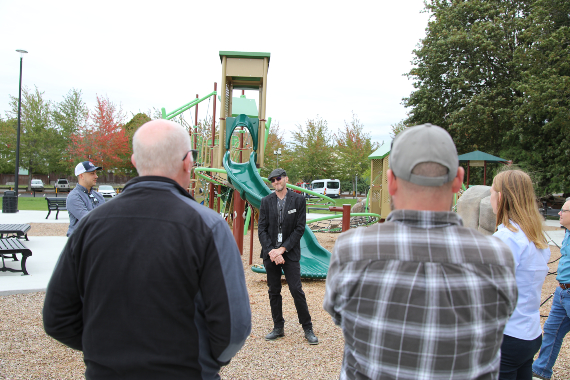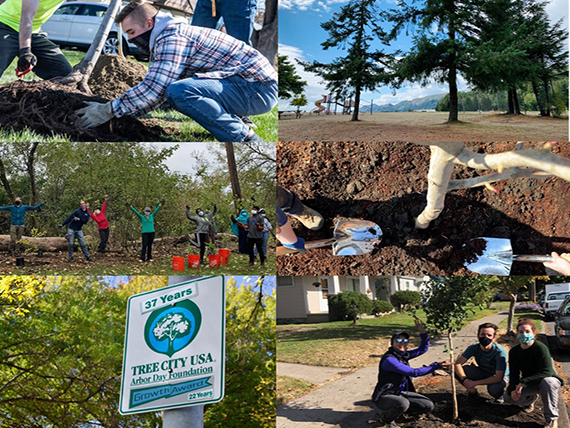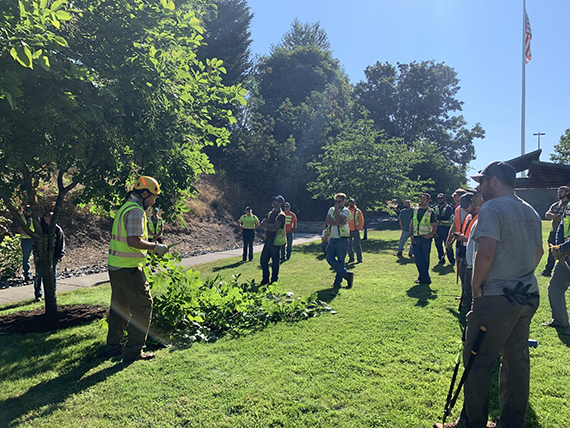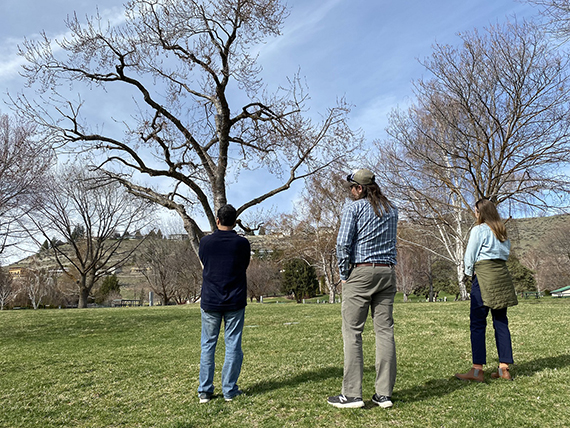Urban and Community Forestry
The Washington State Urban and Community Forestry Program (UCF) works to educate citizens and decision-makers about the economic, environmental, psychological and aesthetic benefits of trees and to assist local governments, citizen groups and volunteers in planting and sustaining healthy trees and vegetation wherever people live, work and play in Washington state.
Our mission is to provide leadership to create self-sustaining urban and community forestry programs that preserve, plant and manage forests and trees for public benefits and quality of life.
The program provides technical, educational and financial assistance to Washington’s cities and towns, counties, tribal governments, non-profit organizations, and educational institutions. Explore the links below to learn more.
View the latest issue of Tree Link Newsletter to learn up-to-date information on the UCF Program.
Choose a section below to learn more:
- The Evergreen Communities Act and Evergreen Community Recognition Program
- Tree Equity and the Tree Equity Collaborative
- Arbor Day and Tree City
THE EVERGREEN COMMUNITIES ACT AND EVERGREEN COMMUNITY RECOGNITION PROGRAM

Renton Urban Forestry and Natural Resources Manager Ian Gray (center) leads a tour of Philip Arnold Park during the launch of DNR's Evergreen Community Recognition Program. (Faith Hardersen/DNR)
The Washington State Legislature equipped the Urban and Community Forestry Program with long-needed resources in 2021 when it passed House Bill 1216. An revision and expansion of the Evergreen Communities Act (ECA) first passed in 2008, the bill expanded the authority of DNR to assist Washington cities, counties, Tribes, and other public bodies to establish and maintain their urban and community forests.
The Legislature also provided $2.68 million in state funding for the 2021-2023 biennium, a critical resource not included with the original ECA due to the global financial crisis that year. The funding allowed DNR to increase its dedicated UCF staff from two people to a roster of 10, and to increase the amount of its annual grant awards sevenfold.
House Bill 1216 also directed DNR to create the Evergreen Community Recognition Program to recognize and celebrate Washington’s incorporated municipalities, counties, and Tribes for their commitments made to urban and community forestry, as well as their ongoing and planned efforts to intentionally manage of their urban forests.
The ECA requires specific funding programs across multiple state agencies in addition to Washington DNR to consider and/or provide preference to applicants recognized as Evergreen Communities.

Stickers available for Evergreen Communities in Washington to distribute in celebration of their achievements. (Faith Hardersen/DNR)
The legislation also mandates at least 50 percent of the funding or assistance provided by HB 1216 be used to benefit vulnerable populations in or within one-quarter mile of highly-impacted communities, as defined by tools such as the Washington Environmental Health Disparities Map.
DNR has awarded more than $4.5 million as of October 2024 to urban and community forestry projects supporting environmental justice and equity efforts across Washington.
Ongoing and future work associated with HB 1216 and the Evergreen Communities Act includes: completing a statewide inventory of urban and community forests; identifying priority regions for accelerated implementation of urban forestry tools and programs; establishing and implementing criteria for awarding an Evergreen Community designation to deserving applicants.
TREE EQUITY AND THE WASHINGTON STATE TREE EQUITY COLLABORATIVE

Volunteers help plant a tree during the Tree Equity Collaborative launch event May 2023 in Seattle. (Rachel Terlep/DNR)
No matter where in Washington you live, a common truth exists: whiter, wealthier neighborhoods are more likely to have robust and healthy urban tree canopies than neighborhoods with a diversity of people live near or below the poverty line.
This disparity can be traced back to the practice of redlining in the 1930s. This not only deprives those underserved neighborhoods of the benefits to health and infrastructure urban trees provide, but helps create urban heat islands that can turn a dangerous heat wave into a deadly one.
Using the Tree Equity Score Analyzer created by American Forests and other datasets provided by federal partners, state agencies (including DNR), and local organizations, UCF and our partners are committed to achieving true tree equity -- that everyone in Washington has access to the full suite of benefits provided by a thriving urban forest.
To that end, DNR and American Forests launched the first statewide tree equity collaborative in April 2023, bringing an array of local, state, Tribal, and federal partners from across Washington together to build more rigorous and inclusive urban forestry programs throughout the state. Through this partnership, American Forests is working with DNR to expand its Tree Equity Score Analyzer to cover all Washington cities.
GRANT FUNDING
The DNR Urban and Community Forestry Program (UCF) offers grants to cities and towns, counties, tribal governments, non-profit organizations, and educational institutions to improve the health of community forests and develop local urban forestry programs.
Eligible applicants include 501c3 organizations, tribes, cities, towns, counties, educational institutions, and special taxing districts (conservation districts, parks districts, school districts, etc.) in Washington state
Until 2022, nearly all of the grant funding awarded by UCF was pass-through funding administered in partnership with the United States Department of Agriculture (USDA). Thanks to the passage of HB 1216 in 2021 and associated funding from the State Legislature, DNR was able to rely on state funds for the first time in 2022 to award $550,000 in grant funds to 21 recipients.
Those high-water marks for UCF stood until February 2024, when DNR announced its intent to award more than $8 million as part of the 2024 Community Forestry Grant Assistance Program. The program used $5 million in USDA Forest Service pass-through funding and $3 million of state dollars to support more than 40 projects from Seattle to Spokane.
DNR has administered nearly 250 urban and community forestry grants since 2008 in partnership with the USDA Forest Service and other organizations. We are grateful each year for their hard work and support of urban forestry in the Evergreen State.
DNR is not accepting grant applications at this time. We anticipate releasing more information about the what's next for the Community Forestry Grant Assistance Program in early 2025.
The following links and documents may be used as reference materials for people and organizations potentially interested in applying to future grant cycles.
- Request for Applications (RFA)
Community Forestry Assistance Grants: 2024 Grant Cycle Webinar Series
The DNR Urban & Community Forestry Program recorded a series of webinars to assist applicants in preparing an application. Each webinar includes helpful information about our grants and our intentions for the 2024 grant cycle. The webinars are one hour in length and include time for questions at the end.
The hyperlinks to the webinar recordings and their corresponding passcodes are as follows:
- Urban Forestry Grant Webinar #1 – An overview of DNR Urban Forestry Grants—structure, format, processes, and timelines.
Webinar 1 Recording - Passcode: $6K#K7id - Urban Forestry Grant Webinar #2 – Your proposal through the eyes of a grant reviewer—best practices, tips on how to apply, and pitfalls to avoid
Webinar 2 Recording - Passcode: B92Z5T?g - Urban Forestry Grant Webinar #3 – Intent and expectations
Webinar 3 Recording - Passcode: K=df+PG9
ARBOR DAY AND TREE CITY

Examples of Arbor Day celebrations across Washington.
Washington State Arbor Day is always celebrated on the second Wednesday in April. Did you know that proclaiming Arbor Day at the local level can help your community earn the Tree City USA designation? Recognizing Arbor Day is one of four requirements for earning this award. Explore a map of the current Tree City USA Communities in Washington state.
Washington communities and universities that have earned the Tree City USA or Tree Campus USA award are once again eligible for reimbursement by DNR for the planting of at least one landscape-sized Arbor Day tree. Eligible communities are advised to download the $500 reimbursement form (Word) and follow the instructions.
The Arbor Day Coloring Book is available to learn why people need trees and trees need people.
FINANCIAL ASSISTANCE
The following is an overview of our other financial assistance programs in more detail:
-
Arbor Day Tree Reimbursements (download the Reimbursement Form): Communities who have earned the Tree City USA designation can be reimbursed for the costs, or a portion thereof, associated with planting landscape-sized trees at their annual Arbor Day celebration. Some restrictions apply. Documentation of costs and activities is required. Match (in-kind or financial) is required.
-
Scholarships and Internships: Professional scholarships may occasionally be made available for our constituents to attend local, regional, or national conferences, workshops, seminars, or training classes. Internships may occasionally be made available for students pursuing studies or research projects in urban and community forestry in Washington. Questions about scholarships, internships, or other forms of financial assistance may be directed to urban_forestry@dnr.wa.gov.
EDUCATIONAL ASSISTANCE

An urban forestry technician demonstrates how to properly prune a tree.
Regional Seminars: Seminars are roughly four hours of professional presentations on topics relevant to urban forestry. Seminars are mostly indoors, free to participants and typically planned months in advance in partnership with host cities. Visit our TreeLink newsletter to learn more about upcoming seminar offerings.
On-site Staff Training: Trainings are roughly one to two hours of instruction covering hands-on skills for tree care. These are available to program constituents by request as DNR staff schedules permit.
Stop! Don't Top That Tree: The Washington State Department of Natural Resources (DNR) promotes an anti-tree topping campaign to increase public understanding of proper tree care. To find out more please see our Anti-Tree Topping Webpage.
TECHNICAL ASSISTANCE

Urban and Community Forestry Program Manager Ben Thompson (center) consults with local professionals about how to best care for their community forest.
Program staff are available to provide technical assistance to local governments, 501(C)3 non-profits, tribes, and educational institutions.
Examples of technical assistance include: participating in the review, evaluation, and redrafting of tree ordinances; providing consultation on urban forestry strategies, plans, policies, and practices; helping city staff triage and prioritize program needs, providing training to field staff on topics of pruning, planting, or identification of tree defects; giving presentations to city councils, planning commissions, or civic organizations; and working with citizen tree boards or committees on improving effectiveness.
Not sure if the needs of your organization fit into any of these categories? Inquire by email at urban_forestry@dnr.wa.gov.
WASHINGTON COMMUNITY FORESTRY COUNCIL
The Washington Community Forestry Council is established under RCW 76.15 to advise and support the Department of Natural Resources on policies and programs related to community and urban forestry.
URBAN TREE LEARNING CENTER
An abundant, healthy urban tree canopy increases property values, reduces storm water runoff and erosion, improves air quality and reduces energy used for heating and cooling. Every tree makes a difference. Discover the value of the benefits provided by individual trees around your home and in your community with the National Tree Benefit Calculator and explore some recently published resources that can be used to help protect, expand and enhance urban tree canopy.
The Emerald Ash Borer is an exotic, invasive pest that has decimated ash tree populations whose presence is now confirmed in the Pacific Northwest. This pest has not yet been detected in Washington, but it will cause significant impacts on Washington’s urban forests when it arrives. Check out the Recommendations for Emerald Ash Borer Response in Washington Communities for prevention and treatment.
A single detected pest can, and often does, indicate the presence of a much larger population. Without organizational structures and prevention methods in place, the worst of these pests can have costly, irreversible and lasting impacts to the forests they infest. Take action to be pest ready in your community. Learn more with the Washington Urban Forest Pest Readiness Playbook. Also, watch the Urban Forestry Virtual Pest Summit (YouTube links Day 1 and Day 2) to gain an understanding of pests in urban forests: who they are and what to do about them.
Urban tree canopy assessments are foundational to understand the amount and distribution of tree canopy cover in a community to set goals and targets to strategically increase canopy cover and prioritize protection of existing tree canopy. Essential tools are needed when building an urban tree canopy model. Learn what they are and how to use them with the Urban Tree Canopy Assessment Toolkit.
Trees as a major component of the stormwater solution. Consider an interdisciplinary approach to collaboration and co-design of green infrastructure and urban forest management for the compounding benefits provided to the community. This web-based Toolkit provides resources for more productive collaboration, the power of strong partnerships, influential champions, and public engagement. Learn more from the Urban Tree Canopy and Stormwater Management Project (Technical Report).


